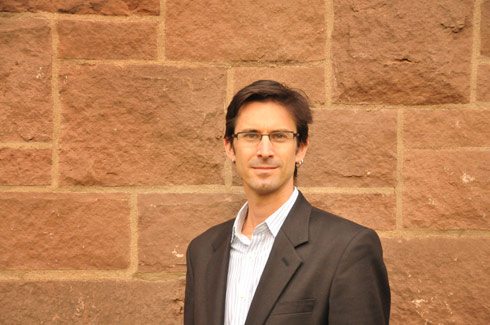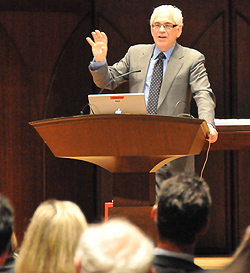5 Questions with…Ethan Kleinberg

As the College of Letters (COL) celebrates its 50th anniversary, we asked Ethan Kleinberg, associate professor of history and letters, director of the COL, about his life in two departments, his views on interdisciplinary teaching, how this impacts his own scholarship, and the future of the COL.
Q. How did you end up with a joint appointment in the College of Letters and History Department?
EK: As an undergraduate at U.C. Berkeley I created my own curriculum combining philosophy, history and religion as a “Humanities Field Major.” In graduate school at UCLA I combined work in History and Comparative Literature and served as a graduate fellow at the U.C. Humanities research Institute at U.C. Irvine where I also studied with Jacques Derrida. When I received a Fulbright to conduct research in Paris it was as a “philosopher.” When I saw the job description for a joint appointment between a History department and an interdisciplinary major that combined literature, philosophy and history and I said to my wife “this job is me!!!” I was overjoyed when I got the call offering me the position. How many other Professors get to teach Frantz Fanon’s Black Skin, White Mask one day and Milton’s Paradise Lost the next?
Q. Has this given you a new perspective on the academic disciplines and interdisciplinarity?
EK: The challenges and rewards of a life in two departments forced me to think about the parameters of the historical discipline as well as to appreciate the different sorts of questions asked by philosophers, or literary scholars. Beyond this, the responsibilities of serving as Director of the College of Letters led me to research the origins of the Wesleyan “College Plan” in 1959 and then to publish an article on the challenges facing interdisciplinary programs and departments in the 21st century. Wesleyan still stands at the fore of interdisciplinary teaching and scholarship, but we have to improve the ways that we provide our interdisciplinary programs and departments support without sacrificing the disciplines that ground them.
Q: Has your intellectual work been altered by your appointment?
EK: I feel that the support and interest of my colleagues in the History Department have allowed me to develop as an historian even as I branch out into areas such as critical theory and the philosophy of history. I have been an editor for the Wesleyan based journal History and Theory, also celebrating its 50th year, since my arrival at Wesleyan and this has been a source of both joy and inspiration. Then of course there are the realities of teaching in the College of Letters. In any given year I could be teaching texts of antiquity, the middle ages, the early modern, or the modern and in most cases I teach alongside a scholar from another discipline. The joy of this endeavor is that I am always learning alongside and often from the students.
Q. What projects are you working on currently?

I have two projects on the front burner right now. The first is a book on the Talmudic Lectures that the French-Jewish philosopher Emmanuel Levinas presented in Paris between 1960 and 1990. This book explores the role and place of the author and authority in intellectual production but also the tense relation between religious belief and historical interpretation. The other project is focused on the utility of employing deconstruction for the writing of history. This project came about as a result of research into the relationship of Emmanuel Levinas and Jacques Derrida that just seemed to click while I teaching a class on Derrida for my 20th century intellectual history class. This led me to write an article entitled “Haunting History: Deconstruction and the Spirit of Revision” for History and Theory. I am looking forward to completing this book while serving as Director of the Vassar-Wesleyan Paris Program next year.
EK: This is a tough one. A bit of speculative history I suppose. While I can’t say with any certainty what the academic trends will look like in 50 years I do know that structure of the College of Letters is such that it will be able to move and thrive with the times. At our recent 50th anniversary celebration dinner I was amazed by the ways that the class of 1959 and the class of 2009 were able to come together around a shared experience and a shared body of texts. To be sure the interpretations differed but the COL experience of cultivating the educated imagination, the ability to think individually but discuss collectively, allowed all of our alums to immediately connect across the generations.

